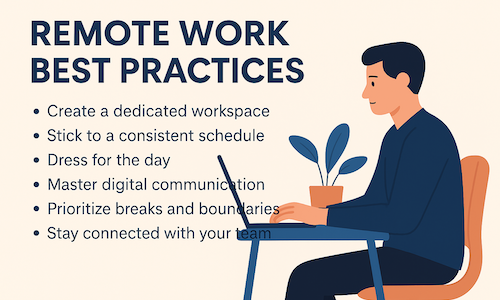Mastering Communication & Soft Skills for Career Success

Job Corner
May 28, 2025
52
In today’s dynamic workplace, technical knowledge and job-specific skills are essential—but they’re not enough on their own. Employers increasingly value communication and soft skills as critical drivers of team performance, leadership, and long-term career growth.
Whether you're just entering the job market or advancing into leadership, mastering these skills can significantly enhance your professional presence and open doors to new opportunities.
What Are Soft Skills?
Soft skills are non-technical traits that define how you work, collaborate, and communicate. These include:
Verbal and written communication
Emotional intelligence
Active listening
Adaptability
Conflict resolution
Teamwork
Time management
Unlike hard skills, soft skills are transferable across roles, industries, and stages of your career.
Why Communication & Soft Skills Matter
Improve Team Collaboration
Effective communication fosters trust, reduces misunderstandings, and promotes productivity.
Enhance Leadership Potential
Good leaders inspire, delegate effectively, and resolve conflicts—all relying on strong interpersonal skills.
Boost Career Opportunities
Candidates with strong soft skills are more likely to land interviews, promotions, and leadership roles.
Navigate Workplace Challenges
From delivering feedback to managing stress, soft skills help you respond thoughtfully under pressure.
Key Communication & Soft Skills to Develop
1. Active Listening
Pay full attention when others speak. Ask questions, clarify points, and avoid interrupting. This shows respect and deepens understanding.
2. Empathy & Emotional Intelligence
Understand and manage your emotions, while also recognizing how others feel. It’s vital for teamwork and leadership.
3. Public Speaking
From meetings to presentations, the ability to speak clearly and confidently is a major asset.
4. Non-Verbal Communication
Body language, facial expressions, and tone all influence how your message is received.
5. Conflict Resolution
Learn to address disagreements calmly and constructively to foster a positive work environment.
6. Time Management
Prioritize tasks, set deadlines, and avoid procrastination to increase productivity.
How to Improve Your Communication & Soft Skills
Join Speaking Clubs (like Toastmasters)
Take Online Courses on platforms like Coursera or edX
Practice Feedback in a constructive, non-confrontational way
Observe Great Communicators in your workplace or through TED Talks
Volunteer for Team Projects to hone leadership and collaboration
Real-World Benefits
| Skill | Real-World Impact |
|---|---|
| Communication | Clear emails, productive meetings, better negotiations |
| Teamwork | Stronger collaborations and project outcomes |
| Emotional Intelligence | Higher employee satisfaction and loyalty |
| Adaptability | Smooth transitions during change and uncertainty |
How JobCorner.org Can Help
At JobCorner.org, we believe communication and soft skills are just as vital as your resume. We offer:
Career Advice Articles on personal development and workplace communication
Workshops & Webinars featuring experts in soft skill training
Interview Tips that teach you how to communicate your value effectively
Community Support for practicing and receiving feedback on soft skills
Final Thoughts
Your soft skills define your professional identity just as much as your technical abilities. By developing clear communication, empathy, and adaptability, you position yourself not just as a competent worker—but as a leader, team player, and strategic thinker.







